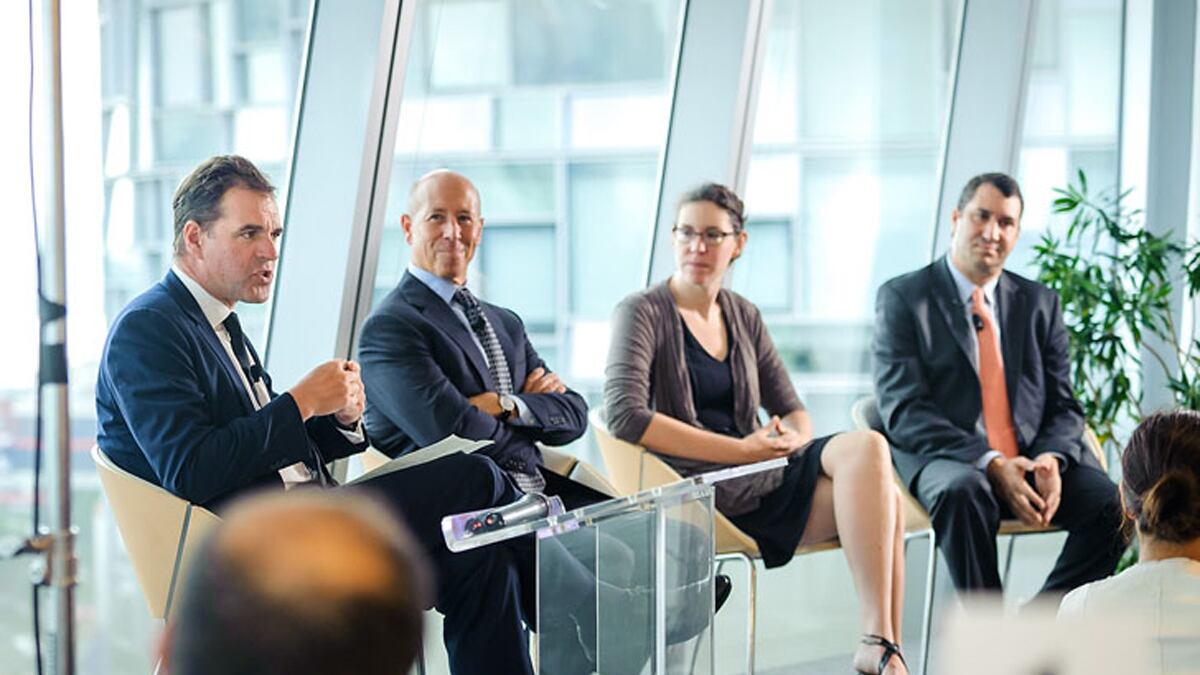In a typical campaign year, economics is destiny. Incumbents find it difficult—if not, impossible—to win re-election when there’s widespread dissatisfaction with the economy. But this year may prove to be atypical. Niall Ferguson, author of the recent Newsweek cover that was highly critical of the president’s tenure, sees President Obama’s continued polling strength is something of a paradox. “The US economy is growing at half the rate we were led to expect,” Ferguson said, kicking off a Wednesday Newsweek/Daily Beast breakfast. “So why is the president so far ahead?”
“This economy sucks,” as Barry Sternlicht put it. Sternlicht, who founded the W hotel chain and is now chief executive officer Starwood Capital—an investment firm with $20 billion under management—gave a dire prognosis for the American economy, and a tepid-but-firm endorsement of Mitt Romney. “Businesses are paralyzed,” he told the crowd. “The patient is lying on the table. They keep telling us to get up and walk, then hit us with morphine.” In Sternlicht’s view, the combination of ultra-permissive monetary policy, uncertain fiscal policy, and a lack of clarity and executive leadership from the White House have produced an environment that discourages businesses from putting cash to work. He believes, however, that the focus on social issues is buttressing President Obama’s support, especially among women.
Of course, there have been a few green shoots of recovery. As Newsweek/Daily Beast Global Business Editor Daniel Gross put it, “some data,” like the housing and retail sales figures, “is moving in the right direction.” That could help the president. Even if we’re not back to pre-crisis prosperity, “Americans are feeling better off than they were a year or two ago.” Megan McArdle, special correspondent for business, economy, and social policy, added that, despite good news for some Americans, those without jobs are still in dire straits. Some are converting to disability, while others are dropping out of the labor market altogether. But again, to Obama’s advantage, “those people don’t tend to vote.”
So why isn’t Romney polling better? For one, Romney hasn’t run the most inspiring campaign—or the most specific. As pollster Doug Schoen put it, “One thing that’s missing is a sense of a specific plan. Sixty-five to 70 percent of voters, regardless of ideology, want the specifics.” That’s why so few voters are tuning in to the conventions. “Why would it be a logical act to watch a bunch of speeches that say nothing?”
Sternlicht, who has hosted a Romney fundraiser, says that despite Romney’s flaws as a candidate, he’s the man to revive private sector confidence. “Obama is not a businessman,” he says. “He believes you have to divide up a smaller pie. Romney wants to grow it.” Sternlicht believes political leaders need to reassure business leaders—fearful of seesawing interest rates and impending fiscal cliff—that it’s safe to start deploying their “mountain” of built-up corporate cash: almost $2 trillion, depending on whom you ask. Up to now, uncertainty has kept those assets chained: “with no place to put the money,” Sternlicht says, “we may as well put in stocks,” which helps explain this year’s Wall Street rally. A regime change at 1600 Pennsylvania Avenue, says Sternlicht, would unleash that capital and “blow the doors off” the economy.
From a granular policy perspective, the man in the Oval Office might not make much of a difference. As McArdle pointed out, both Obama and Romney would have to deal with similar challenges. Both would have to roll back some entitlements, raise some taxes, and deal with Europe—which, as Ferguson put it, “is back from vacation, and will resume failing.” And Sternlicht noted that whoever wins will benefit from the continuing comeback in housing and rising production of natural gas.
But for all the focus on the markets—and of course, this Friday’s blockbuster August jobs numbers—this election may prove less about the economy than anticipated. Since “there’s nobody who’s going to the center,” as Sternlicht put it, voters may focus on social issues. And as McArdle put it, “most of the economic results that matter to Obama are already baked into the cake.”






